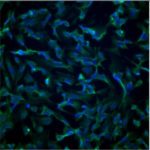Lien vers Pubmed [PMID] – 12678755
Curr Med Chem Anticancer Agents 2001 Nov;1(3):219-35
There is considerable interest in the development of sequence-selective DNA drugs. Chemical agents able to interfere with DNA topoisomerases – essential nuclear enzymes- are widespread in nature, and some of them have outstanding therapeutic efficacy in human cancer and infectious diseases. Several classes of antineoplastic drugs, such as amsacrine, daunorubicin, etoposide (acting on type II topoisomerases), camptothecin and indolocarbazole derivatives of the antibiotic rebeccamycin (acting on type IB topoisomerases), have been shown to stimulate DNA cleavage by topoisomerases leading to cell death. However, these molecules exhibit little sequence preference. A convenient strategy to confer sequence specificity consists in the attachment of these topoisomerase poisons to sequence-specific DNA binding elements. Among sequence-specific DNA ligands, oligonucleotides can bind with high specificity of recognition to the major groove of double-helical DNA, resulting in triple helix formation. In this context, derivatives of camptothecin, indolocarbazole, anthracycline and acridine poisons have been covalently tethered to triple helix-forming oligonucleotides. The use of triple-helical DNA structures offers an efficient system to target topoisomerase I and II-mediated DNA cleavage to specific sequences and to increase the drug efficacy at these sites. Chemical optimization of the conjugates is essential to the efficacy of drug targeting. Consequently, the rational design of this new class of anti-cancer agents, conceived from topoisomerase poisons and triplex-forming oligonucleotides, may be exploited to improve the efficacy and selectivity of the DNA damage induced by topoisomerases.

